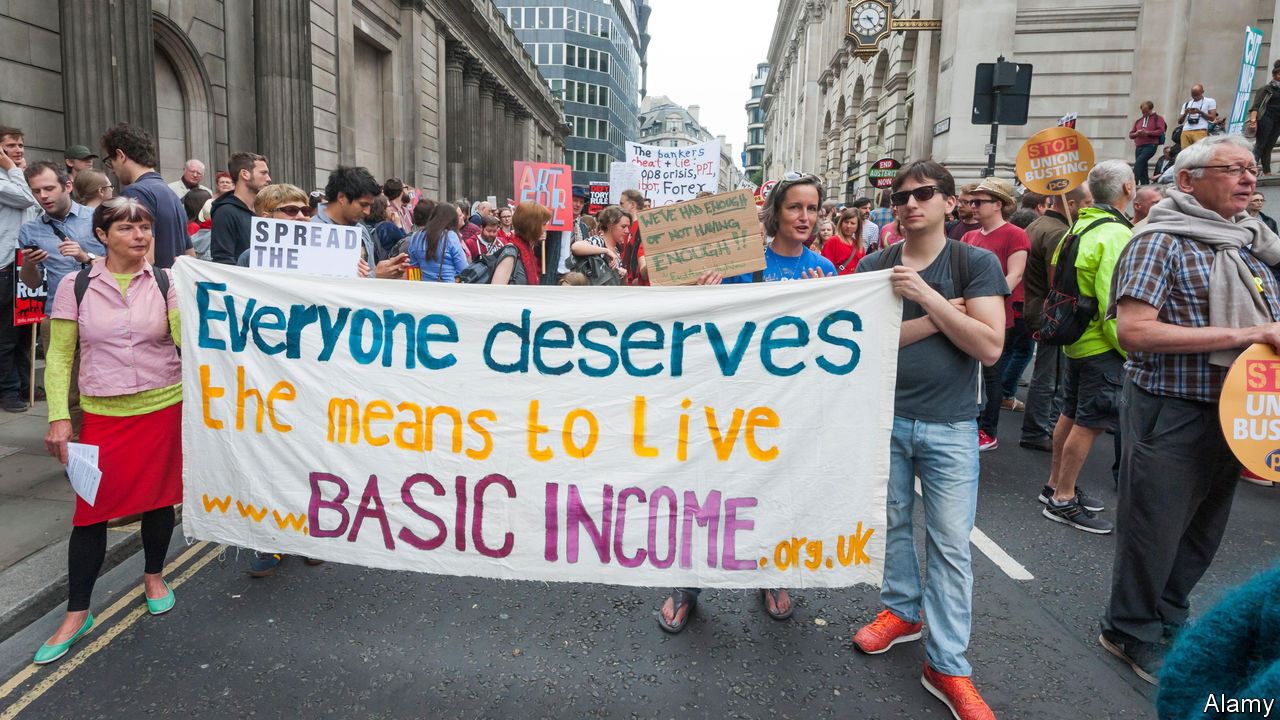A BASIC income (BI) is defined as a modest, regular payment to every legal resident in the community, paid unconditionally as a right, regardless of income, employment or relationship status.
Contrary to conventional wisdom, the case for BI does not rest on the assumption that robots and artificial intelligence will cause mass unemployment or that it would be a more efficient way of relieving poverty than present welfare systems (although it would). The main arguments are ethical and relate to social justice, individual freedom and the need for basic security.
First, a BI is a matter of social justice. The wealth and income of all of us has far more to do with the efforts and achievements of our collective forebears than with anything we do for ourselves. If we accept private inheritance, we should accept social inheritance, regarding a BI as a “social dividend” on our collective wealth. In an era of rentier capitalism, in which more and more income is being channelled to the owners of assets—physical, financial and intellectual—and in which wages will continue to stagnate, a BI would provide an anchor for a fairer income-distribution system. And it would compensate the growing “precariat”, hit by labour flexibility, technological disruption and economic uncertainty.
In an era of rentier capitalism… [a basic income] would provide an anchor for a fairer income-distribution system
Second, a BI would enhance freedom. The political right preaches freedom but fails to recognise that financial insecurity constrains the ability to make rational choices. People must be able to say “no” to oppressive or exploitative relationships, as women know only too well. Some on the right understand that and support a BI. Meanwhile, the left has ignored freedom in its paternalistic social policies. Welfare recipients are treated as subjects of charity or pity, subject to arbitrary and intrusive controls to prove themselves “deserving”.
BI would enhance “republican freedom” from potential as well as actual domination by figures of unaccountable power. As argued elsewhere, a BI is the only welfare policy for which the “emancipatory value” is greater than the monetary value.
Third, a BI would give people basic (not total) security in an era of chronic economic insecurity. Basic security is a natural public good. Your having it does not deprive me from having it; indeed we gain from others having basic security. Psychologists have shown that insecurity lowers IQ and “mental bandwidth”, diminishing the ability to make rational decisions, causing stress and mental illness. Moreover, people with basic security tend to be more altruistic and empathetic, solidaristic and engaged in the community.
People with basic security tend to be more altruistic and empathetic, solidaristic and engaged in the community
Now to respond to the two most frequent objections to basic income. The first is that BI is unaffordable. Many of the sums bandied about are just back-of-the-envelope calculations that assume a certain level of basic income multiplied by the population. Such gross figures ignore clawback through the tax system, savings in other areas of public spending and dynamic effects. Studies in the UK and elsewhere have shown that BI is affordable even with existing tax/benefit systems.
That said, my preference would be a “social dividend” route, creating a national wealth fund built from rolling back the vast regressive subsidies and tax breaks governments now give out, as well as from ecological taxes and levies on all forms of rentier income, including that flowing to Big Tech from use of our personal data and metadata. The fund could pay a small basic income initially that would rise as it grows. As BI pilots and experiments have shown, even a small basic income can have a big impact on nutrition, health, schooling, economic activity and social solidarity.
Even a small basic income can have a big impact on nutrition, health, schooling, economic activity and social solidarity
The second objection is that a BI would induce laziness, undermining the work ethic. This is not borne out by the evidence, especially if all forms of work and not just paid labour are taken into account. Besides giving people more energy, confidence and ability to take risks, a BI would remove the poverty and precarity traps embedded in existing means-tested systems that are major disincentives to taking low-paid insecure jobs.
Since the status quo is untenable and inequitable, opponents of BI should show what alternative they propose that would provide basic security while enhancing freedom and serving social justice. I have not seen any such proposal.
Guy Standing is the author of “Basic Income: And How We Can Make It Happen” (Penguin, 2017)
from Hacker News https://ift.tt/YV9WJO
via IFTTT
